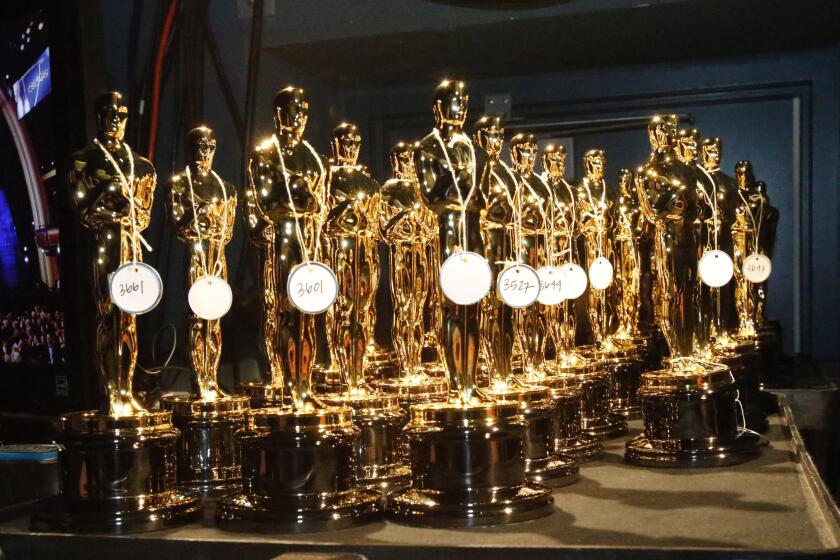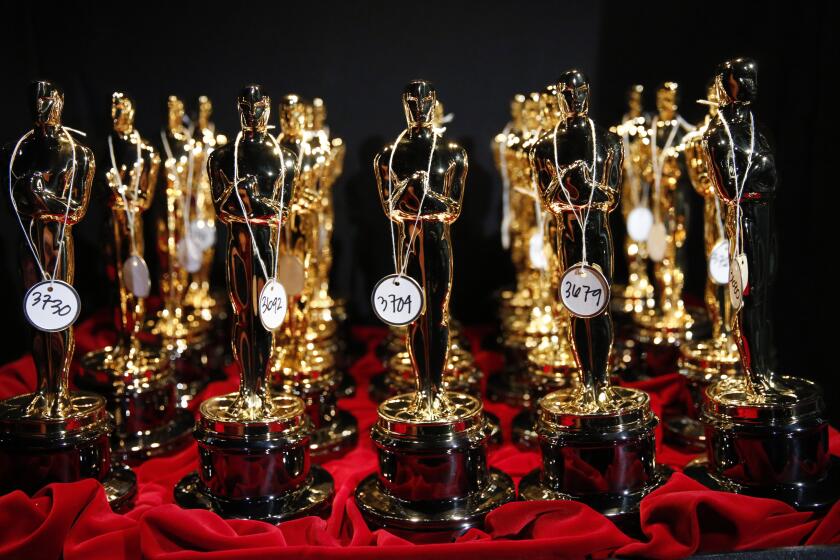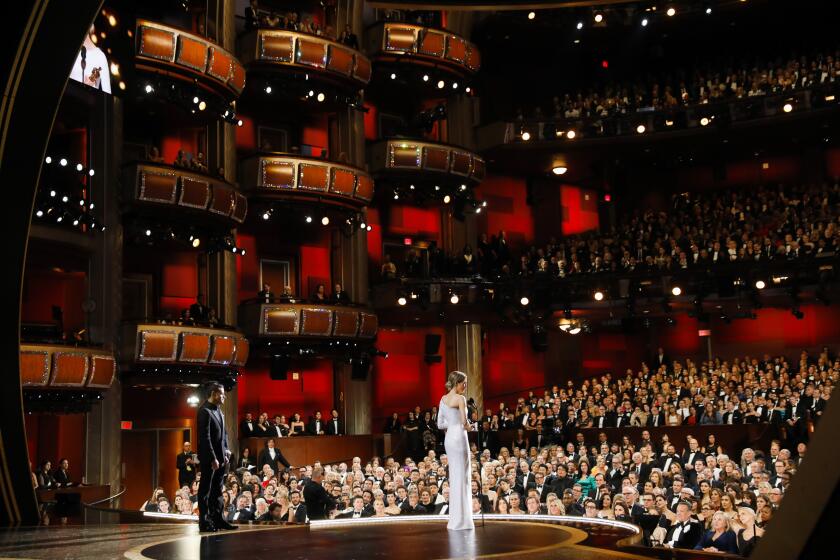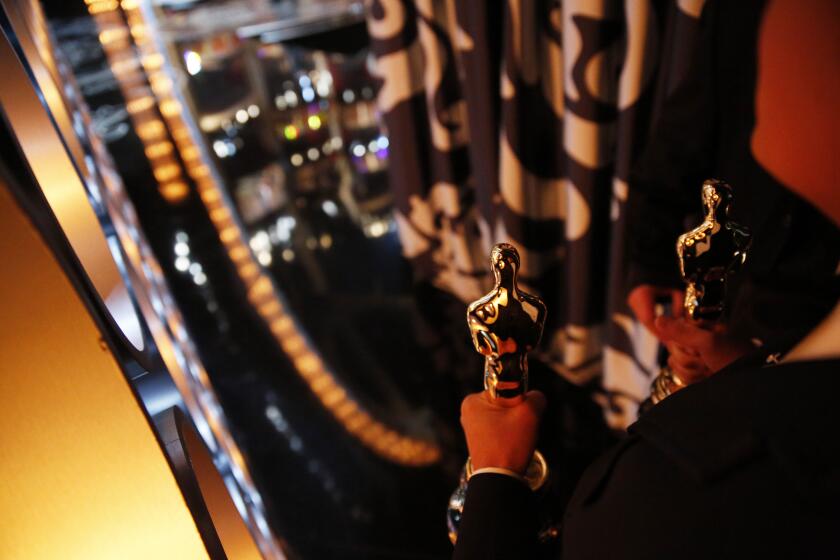Steven Spielberg isn’t the only director grumbling about the Oscars’ show changes
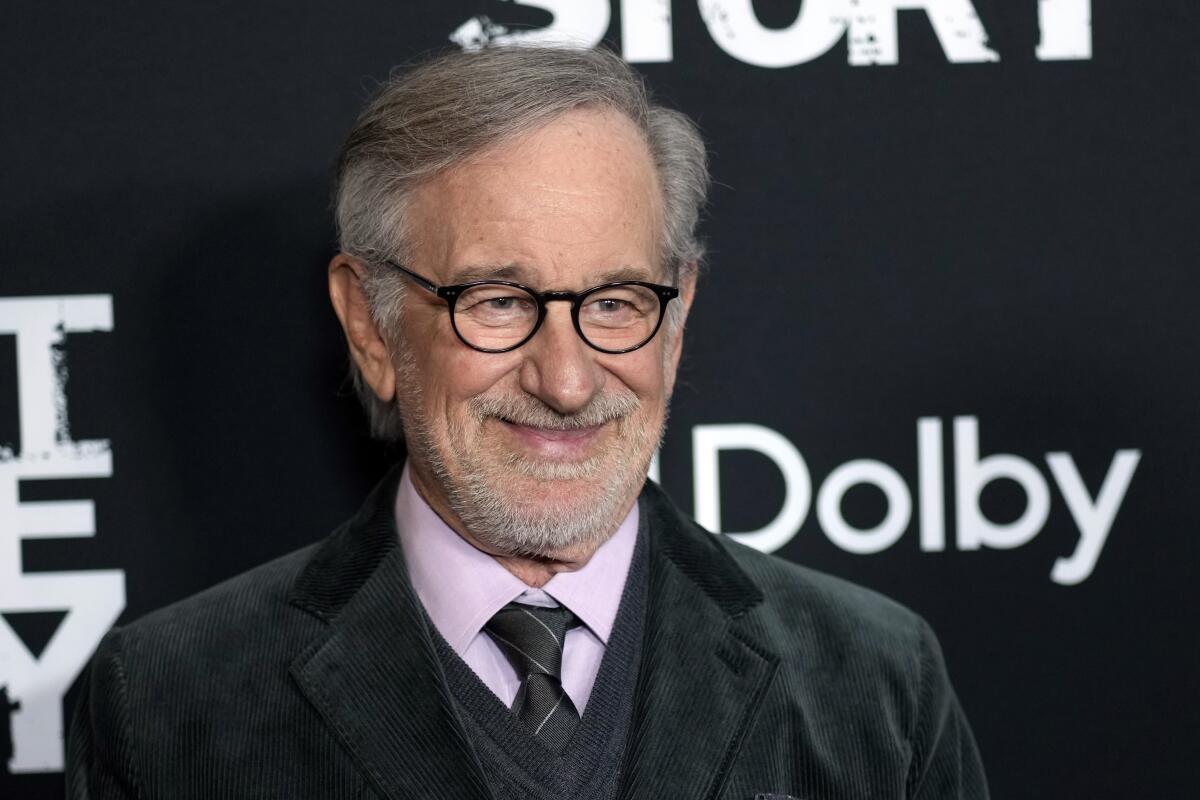
- Share via
The film academy’s decision to alter the Oscars broadcast this year in a bid to reverse last year’s historically low ratings is facing resistance from some of Hollywood’s heaviest hitters.
Directors Steven Spielberg and Jane Campion are among those expressing their dismay in recent days over the decision to move eight categories out of the broadcast window and into the hour before the telecast begins.
And on Wednesday, more than 70 additional concerned academy members — including Oscar winners James Cameron, Kathleen Kennedy, John Williams and Guillermo del Toro — joined them with an open letter specifically asking the academy to reverse its decision.
The letter expressed concern that the changes would be “demeaning” to certain crafts on awards night.
In a new letter to academy president David Rubin, James Cameron, John Williams, Kathleen Kennedy and more criticize the organization for treating some nominees as “second-class citizens”
“Critical artistic crafts like music scoring, film editing, production design, makeup, hairstyling and sound will always deserve the same respect and recognition as crafts like acting, directing and visual effects,” it reads.
Academy President David Rubin wrote last month in a letter to the group’s roughly 10,000 members, “We must prioritize the television audience to increase viewer engagement and keep the show vital, kinetic, and relevant. This has been an important focus of discussion for quite some time.”
One member of the academy’s 54-person board of governors scoffed at the idea that those attending in person would be classy enough to sit politely through an untelevised hour before the broadcast. Eight awards will be handed out starting at 4 p.m. Pacific time, and the results, according to Rubin, will be “folded seamlessly into the live show” that begins at 5 p.m.
“I think most people will be at the bar,” the unidentified governor told the Hollywood Reporter last week. “We are going to need a lot more seat-fillers. So that’s going to be a bummer for the nominees whose awards are being presented then.”
Under pressure to stem a ratings slide, the academy decides that not all Oscars will be presented live on this year’s telecast.
While Rubin said that all nominees and winners will be acknowledged during the broadcast, some of the pomp and circumstance might be muted for nominees in the affected categories: film editing, makeup and hairstyling, original score, production design, sound, documentary short subject, animated short and live-action short.
After a number of academy members spoke up immediately when the changes were announced, here is what a handful of Hollywood’s top filmmakers are saying about changes to this year’s ceremony.
Steven Spielberg
The “West Side Story” directing and best picture nominee disagrees with the decision to separate some disciplines from the main part of the ceremony, given that filmmaking is, as he told Deadline on Sunday, “the most collaborative medium in the world.”
After announcing that eight awards will not be presented live at this year’s Oscars, the film academy once again faces blistering criticism from both within and outside the organization.
“I feel that at the Academy Awards there is no above-the-line, there is no below-the-line. All of us are on the same line bringing the best of us to tell the best stories we possibly can,” Spielberg said. “And that means for me we should all have a seat at the supper table together live at 5.”
He didn’t have high hopes that a reversal would come before this year’s Academy Awards were underway.
The pandemic’s toll on the movie business was reflected in the weak ratings for Hollywood’s biggest night.
“The same thing came close to happening three years ago and at the eleventh hour a decision was made that reversed it and four categories that were in the commercial breaks were reinstated on the live show,” Spielberg said. “I hope it’s reversed, but I’m not anticipating a reversal and I am not optimistic about it.”
Denis Villeneuve
The “Dune” director thought the Oscars were just fine before announcing this year’s changes. Now the show is going through an identity crisis, he told Deadline over the weekend, and people are making some bad choices.
“Honestly, I think that the academy’s throwing the baby out with the bathwater,” Villeneuve said. “I think it’s a mistake. And I understand that they’re under tremendous pressure, but I think it isn’t the right decision.”
He noted that the actors and the directors get a lot of media attention while the rest of the people on a film do not. “All the people that are working in the shadows, they need to be seen and to be recognized, and these award shows are made for them,” he said.
Lady Gaga is out and Kristen Stewart is in for the 2022 Oscars. Here are other major inclusions and omissions.
Jane Campion
The director of “The Power of the Dog,” whose nomination for directing made Oscars history, took issue with one of the categories that will be relegated to the preshow: production design.
“I would have definitely included design in the main body of the awards because design is so vital,” she told Deadline. “It’s one of the most important relationships.”
Unfortunately, in doing so she might have unintentionally suggested that the other seven categories were less vital. Four of her film’s dozen nominations — film editing, score, sound and production design — will happen before the main broadcast.
Ava DuVernay
The “Selma” and “A Wrinkle in Time” filmmaker took issue with one word that keeps popping up in the discussion: excluded. As in, the idea that the eight categories are going to be “excluded” from the awards — which they are not. They will simply be awarded off-camera, before the broadcast begins.
“[T]he word ‘excluded’ is a powerful one for many. It has a particular and heightened meaning to many,” DuVernay told the Hollywood Reporter last week. “I think it’s important to call things by their right name so as not to minimize the meaning of true exclusion in these spaces.”
Amid protests over the decision to move eight awards out of the live telecast, the film academy’s leaders offered further explanation and clarification of the presentations.
Will Packer
OK, he’s not a big-name director, but Packer is one person who thinks the changes are a good idea — and he is producing this year’s Oscars broadcast.
“It’s an oversaturated content environment,” he told Variety last Friday, referring to awards shows in general. “People have choices to watch anything and everything they want.
“I’m going to do the best I can to treat this show with the reverence, respect and proper positioning it deserves,” he continued, “but I’m also going to try to make a very entertaining show.”
More to Read
Only good movies
Get the Indie Focus newsletter, Mark Olsen's weekly guide to the world of cinema.
You may occasionally receive promotional content from the Los Angeles Times.
